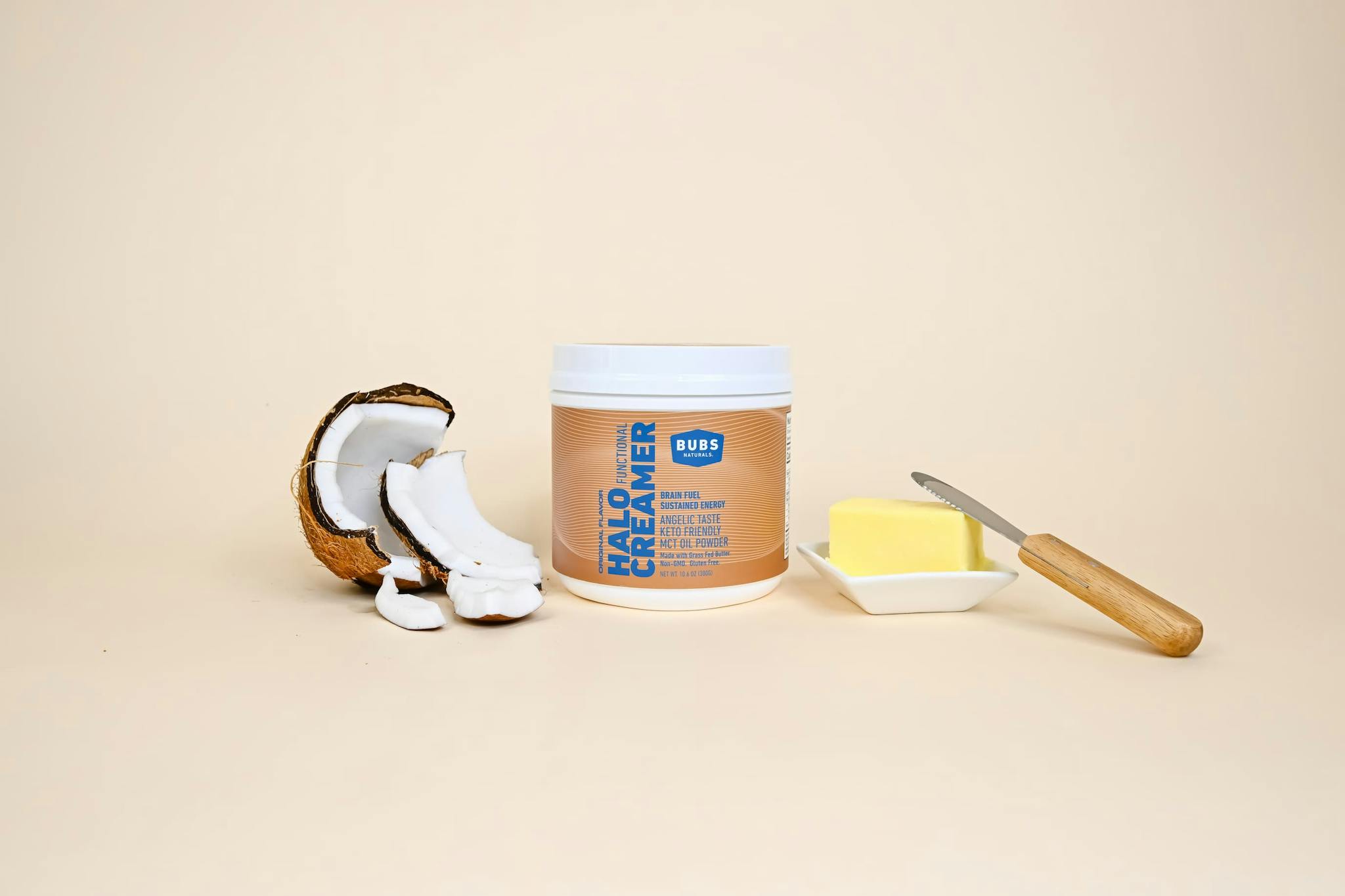
Coffee With Butter: Everything You Need To Know About Functional Coffee
Kolby Seemann
over 1 year ago
There's no contest - coffee is America's favorite beverage. According to Statista, the United States accounts for the highest revenue generation in the coffee market globally, pegged at $11 billion in 2023. In recent years, however, with an increased health consciousness in a post-pandemic world, it isn't surprising that people are seeking milk alternatives for their daily cup of joe. The latest fad capturing coffee lovers' interest is coffee with butter.

Interestingly, adding butter (or another fat) to coffee isn't a new concept. The earliest evidence of this is coffee grounds consumed with clarified butter in the ninth century in Ethiopia. Tibet and Ethiopia were drinking yak butter coffee (and tea) long before it became widespread. In this article, we look at what coffee with butter is, how to make it, and why you should consider drinking it. Is coffee with butter better than milk? How do you choose a quality coffee to drink with butter? We answer some of these questions (and more) for you.
Here's everything you need to know to enjoy your coffee and stay healthy.
Coffee with butter: What is it, and why drink it?
“Butter coffee” is the practice of putting butter in coffee. The recipe often consists of coffee, butter, and MCT oil and is claimed to have several health benefits including assistance with weight loss and boosting cognitive function. As a high-fat drink that’s free of carbohydrates (when unsweetened), coffee with butter is a popular choice among low-carb diet enthusiasts and is believed to have several health benefits, such as the following.Sustained Energy: Butter is a source of healthy fats, and when blended with coffee, it creates a creamy and rich beverage. Some proponents claim that the combination of fats and caffeine can provide a longer-lasting and sustained energy boost throughout the day.
Ketogenic Diet-friendly: Coffee with butter is popular among those following a keto diet, which is a high-fat, low-carb diet. The fats in the coffee fit into the macronutrient profile of the ketogenic diet.
MCT oil and butter are similar in terms of their use in coffee and their impact on satiety and taste.
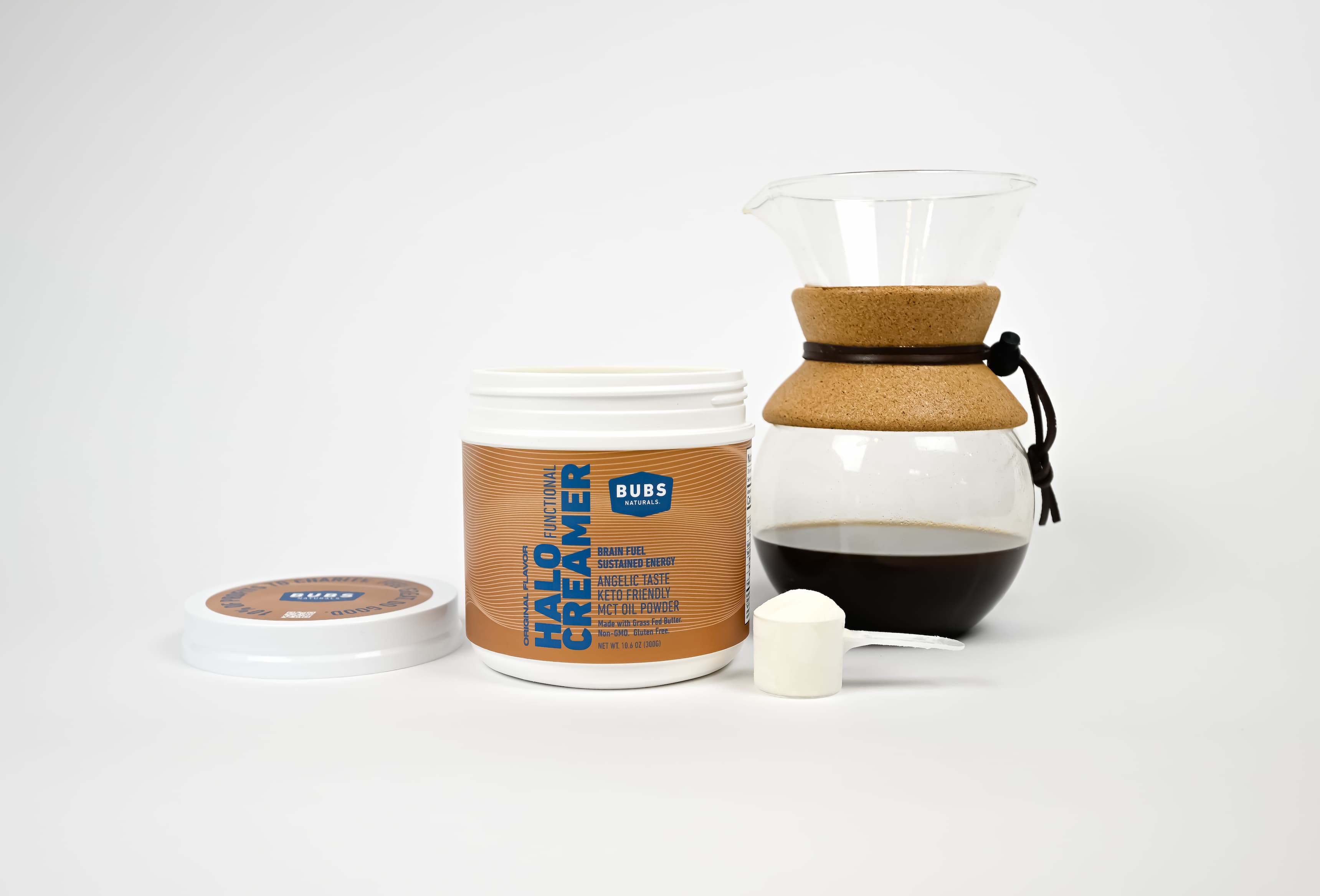
But what about folks who are on a dairy-free diet, but want to try coffee with butter?
BUBS Halo Creamer MCT is a great vegan alternative to butter for the lactose-intolerant. It's also gluten, nut, GMO, soy, and corn-free. A light, free-flowing MCT Oil Powder, this creamer is both portable and gentle on the digestive system. It's also scientifically proven to transform into ketones almost as soon as it is consumed, giving you a clean burst of energy and increased mental clarity.
The science behind coffee with butter
Coffee, by itself, is healthy. According to a new study reported by USA Today, drinking four cups of coffee daily may lower your risk of death. So, what does putting butter in coffee do?
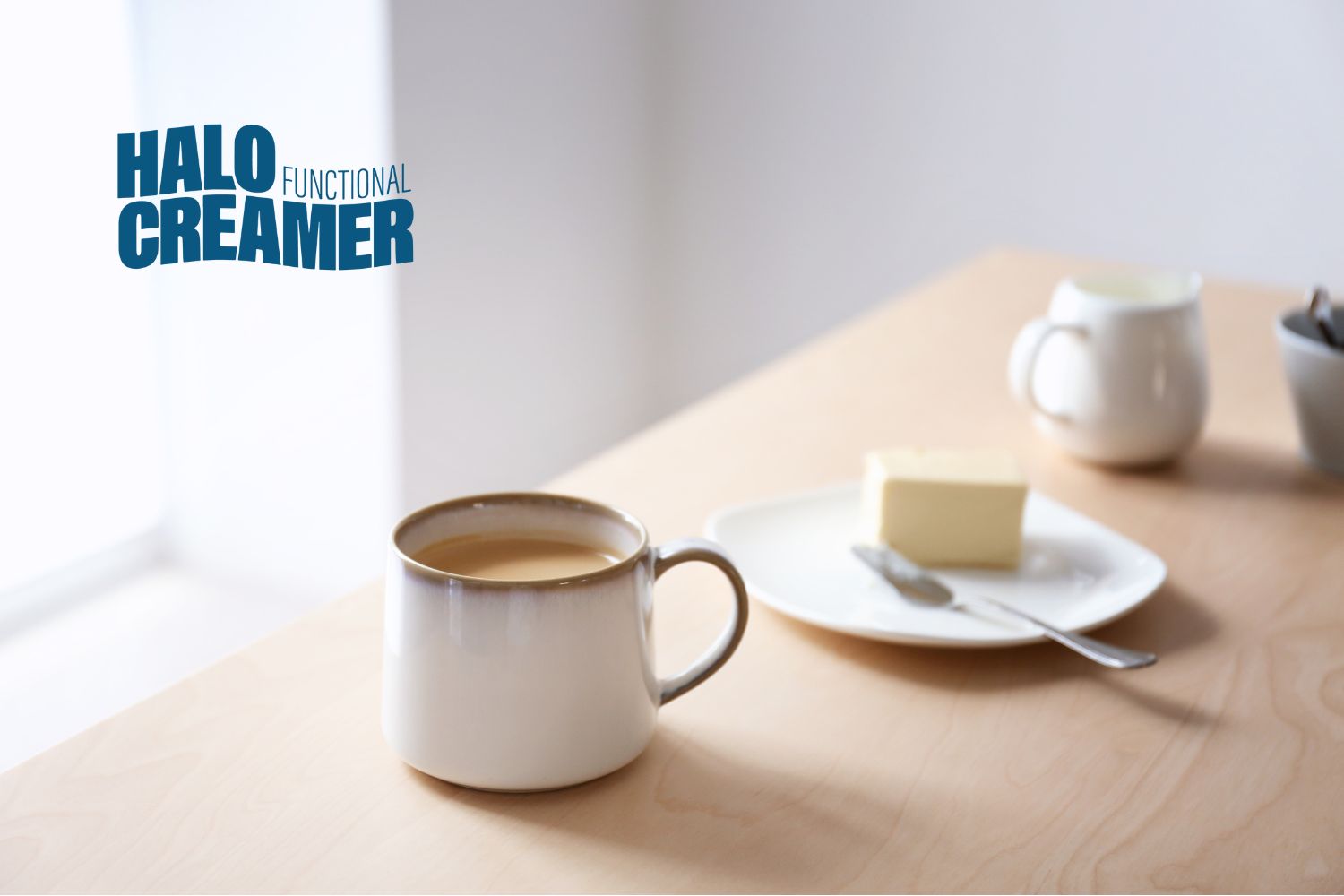
The fat in butter plays a vital role in its compatibility with coffee. Butter is a carrier for flavor compounds in coffee, making them more soluble and enhancing the taste experience. The fat can also mellow out any bitterness or acidity in the coffee, giving you a more rounded flavor profile, besides adding a creamy, velvety mouthfeel that enhances the drinking experience. It's worth noting, however, that the texture can vary based on factors such as the type of butter used and the temperature at which it is added to the coffee. The impact of different brewing methods on the final product can also influence the compatibility of butter and coffee. For instance, the brewing temperature and extraction time can affect the release of flavor compounds and the degree of coffee acidity. This, in turn, can interact with the fat in butter, highlighting or altering different taste aspects.
Brewing methods for coffee with butter
Brewing methods like French press or espresso, with their unique extraction processes, may yield different results when combined with butter than pour-over or drip brewing. The brewing method can impact the balance of flavors, fat solubility, and texture in the final cup.
Ultimately, the scientific principles behind the compatibility of butter and coffee involve the interactions between water, fat, and flavor compounds, resulting in a blended beverage with enhanced taste, texture, and overall sensory experience. The specific impact of brewing methods can further shape the final product by influencing flavor extraction and balance.
Is coffee with butter better than milk?
Whether coffee with butter is better than coffee with milk is a matter of personal preference and dietary needs. However, one study claims, "The effect of milk on coffee's nutritional/functional properties is controversial. Enough evidence suggests negative effects of milk addition on properties of coffee." Here are some health implications coffee drinkers should know about when considering whether to add milk or butter to their morning cuppa.
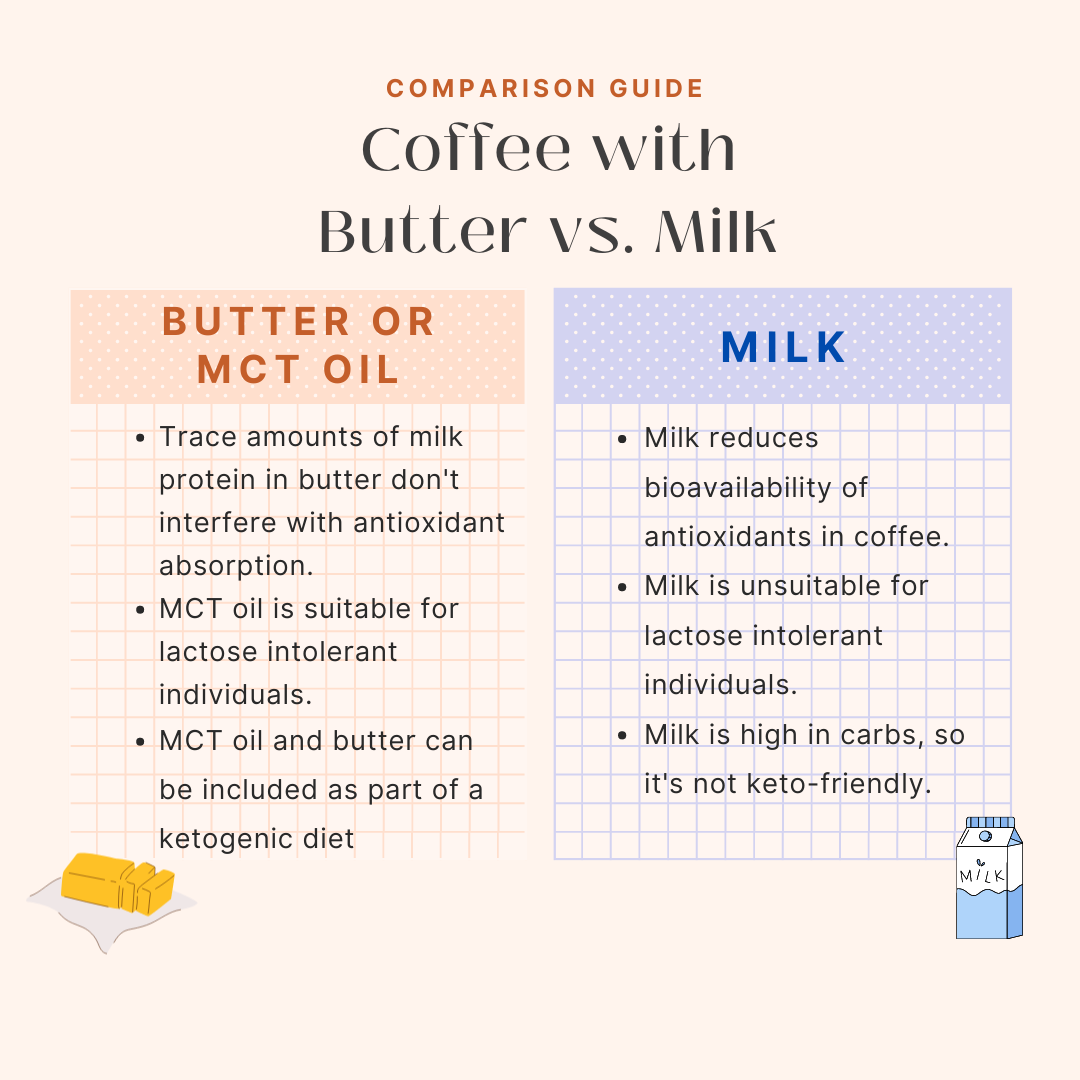
1. Coffee is packed with healthy antioxidants. However, adding milk to coffee negates some of the beneficial effects. It has been found that adding milk to coffee reduces the bioavailability of the coffee bioactives.
2. Butter only has trace amounts of milk protein, which won't interfere with your antioxidant absorption. Adding butter to your coffee might, in fact, increase the antioxidant benefits since it's well-known that fats help your body absorb fat-soluble antioxidants.
3. Butter is higher in fat and calories compared to milk. According to the USDA, a tablespoon of butter has about 100 calories, while a tablespoon of whole milk has approximately 9 calories. However, butter is a good source of fat-soluble vitamins like A, D, E, and K, and it contains essential fatty acids that are important for brain and heart health. In contrast, milk provides calcium, protein, vitamins B12 and riboflavin, and many people find it easier to digest. If you're following a ketogenic or high-fat, low-carb diet, coffee with butter can be a good addition to your morning routine. It can help you feel fuller for longer and reduce cravings, but it may be less suitable for those with heart conditions or high cholesterol levels.
MCT oil is a healthy butter substitute that gives you the same creamy taste with several health benefits. Options like BUBS Halo Coffee Creamer and BUBS Vegan Halo Coffee Creamer are good choices as both are available in a convenient, portable powder format.
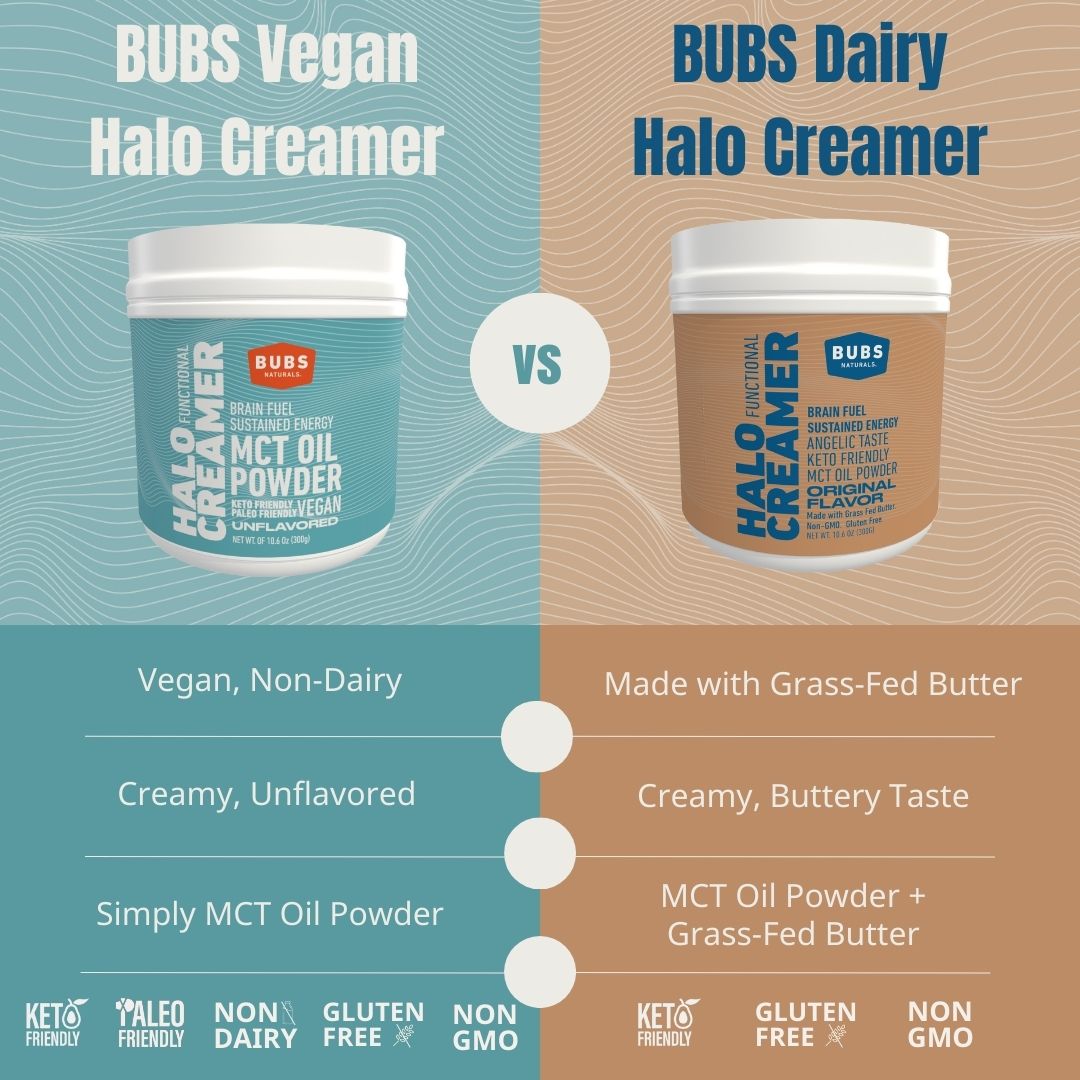
Six reasons to try coffee with butter
Looking for a way to elevate your coffee-drinking experience? Although it may sound unusual, this combination offers a unique taste profile and potential health benefits.
•
Portable & fast-acting energy: Coffee with butter is a powerful addition to your morning routine. The medium-chain triglycerides (MCTs) in butter provide energy - this is the main reason for having coffee with butter. MCTs are easily absorbed by the body and quickly metabolized into ketones, which are like an alternate fuel source for the brain and muscles. This can potentially enhance your energy levels and mental focus. To follow the original coffee with butter recipe, add MCT oil powder to your coffee. It's a purified, saturated fatty acid extracted from sustainably sourced coconuts and more portable than MCT oil. MCT oil powder is also ultra-light and soluble in hot and cold brews.
•
Better digestion and focus: Coffee with butter and MCT oil powder is a perfectly balanced mix of fatty acids with 70% C-08 Caprylic Acid and 30% C-10 Capric Acid. The C-08 Oil skips the digestive tract and goes straight into the liver, unleashing its ketogenic powers. The following surge of clean, non-jittery energy coupled with increased focus and mental clarity can be felt almost immediately after consumption.
•
Brain fuel: The potential cognitive benefits of butter coffee are often attributed to the combination of caffeine from the coffee and the medium-chain triglycerides (MCTs) from the butter or MCT oil. Because our brains cannot store fuel, they require a constant energy supply to maintain peak performance. The ketones in products like BUBS Vegan Halo Creamer (MCT Oil) and BUBS Halo Coffee Creamer both efficiently feed and fuel your brain, supporting cognitive functions.
•
Curb cravings: The high-fat content in coffee with butter might help reduce appetite and curb cravings, leading to a lower calorie intake overall. However, remember that coffee with butter should complement a healthy lifestyle rather than replace essential meals or exercise. It's worth noting that the beverage also fits seamlessly into popular diet trends such as the ketogenic diet or intermittent fasting.
•
Nutritional benefits: Butter contains vitamins A, D, E, and K, essential fatty acids, and other vital nutrients. Incorporating it into your coffee routine adds these valuable nutrients to your diet. Coffee contains essential nutrients like magnesium, potassium, riboflavin, and antioxidants which support various bodily functions.
•
Keto-friendly: All the good fats from MCT oil powder and grass-fed butter (which is high in omega-3 fatty acids) help you feel fuller, longer. Because your body can convert MCT oil into an instant source of energy, without the blood sugar or insulin spike you'd get from sugar, it assists in improving your body's insulin-mediated glucose metabolism, decreasing the likelihood of it being stored as body fat.
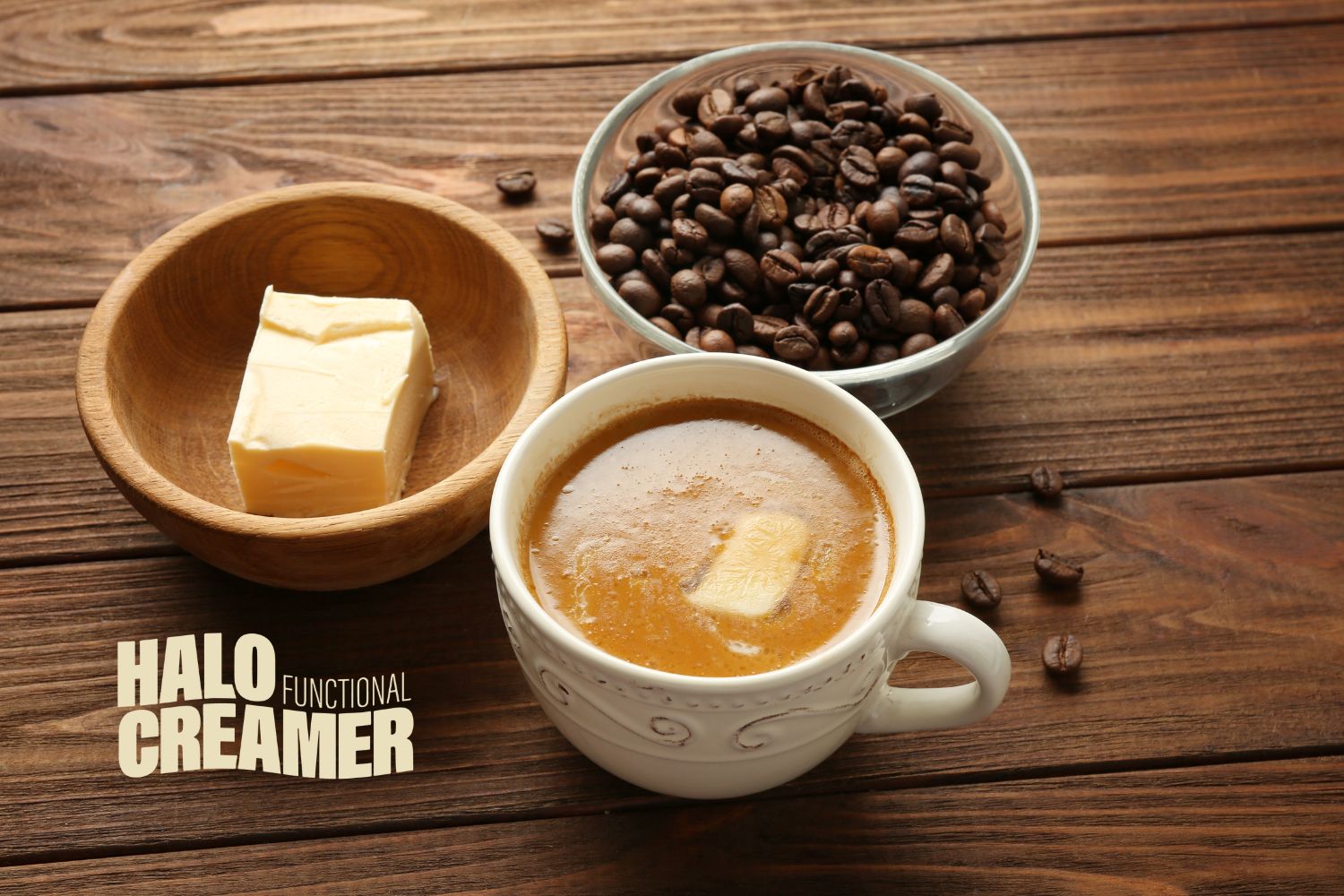
How to choose a quality coffee to drink with butter
Choosing a good coffee can enhance the overall taste and experience. Here are some tips to help you select the right coffee:
•
Quality of coffee beans: Start with high-quality coffee beans like BUBS Brew coffee beans, which are USDA-certified organic and fair trade certified. Look for freshly roasted beans, as this ensures the best flavor. Specialty coffee shops or local roasters often provide a wide selection of freshly roasted beans.
•
Single-origin vs. blends: Consider whether you prefer single-origin coffee or blends. Single-origin coffee comes from a specific region or country, which provides a sense of terroir, showcasing the distinct attributes of the coffee bean's origin. Blends combine beans from various sources to achieve a balanced and consistent taste profile.
•
Medium to dark roast: Medium to dark roast coffees typically have a rich profile with a heavier body, a slightly bitter aftertaste, and lower acidity than lighter roasts. The bold flavors work well with the addition of butter, complementing its richness.
•
Organic and Fair Trade options: If you're concerned about your coffee's environmental and ethical impact, look for organic and fair trade options. These coffees are often produced sustainably and support fair wages for farmers.
•
Flavor notes: Read the flavor notes provided by the roaster or on the coffee packaging. Look for coffees with flavor profiles that you enjoy and think will pair well with the creamy taste of butter. Like wine tasting, coffee can have a range of flavor notes, such as fruity, floral, chocolatey, nutty, or even spicy.
•
Freshness: Always choose freshly roasted coffee beans for the best taste. Check the roasting date on the packaging, and try to use the beans within a few weeks of that date. Remember that moisture can cause coffee beans to degrade, become moldy or stale, so store coffee beans in an airtight container in a cool, dry, and dark place away from moisture and heat sources.
•
Experimentation and Personal Taste: Coffee preferences are highly individual, so feel free to experiment and find what suits your taste buds best. If you have access to multiple coffee options, try a few different ones and see which you like the most with butter.
•
Grind just before brewing: For the freshest flavor, grind the coffee just before brewing. It helps to unlock the aromatic compounds sealed within the beans. If possible, use a burr grinder, as it provides a more consistent grind size compared to blade grinders.
How to make coffee with butter
Butter coffee enthusiasts swear by the improved taste and sustained energy they get from this morning brew. Here’s a step-by-step guide to make coffee with butter at home.
•
Step 1: Heat water to your desired temperature.
•
Step 2: Make your coffee using your preferred brewing method. (Tip: Choose high-quality medium or dark roast coffee)
•
Step 3: Add 1 tsp (10 grams) of BUBS Halo Coffee Creamer or 1 tablespoon of unsalted butter (preferably grass-fed) to your coffee mug. If you don’t eat regular butter, choose ghee, a type of clarified butter lower in lactose.
•
Step 4: Once your coffee is fully brewed, pour it into the mug with the creamer or butter.
•
Step 5: Mix the coffee and butter mixture with a blender or a milk frother until frothy and creamy like a foamy latte.
•
Step 6: Pour the mixture back into your coffee mug. Optionally, add a sweetener like honey or a dash of cinnamon for extra flavor.
Finally, remember you can always adjust the recipe to your taste preferences. You may prefer more or less butter or a different type of sweetener. You can also customize the recipe with ingredients like orange or vanilla extract for added flavor.
Butter coffee recipe variations
Here are some interesting variations on the original butter coffee recipe you may want to try:
•
Mocha Butter Coffee - mix in some cocoa powder or sugar-free chocolate syrup for a chocolatey twist on your butter coffee.
•
Cinnamon Vanilla Butter Coffee - add a dash of cinnamon and a splash of vanilla extract to your mixture for a warm and cozy flavor.
•
Mint Chocolate Butter Coffee - mix in a drop or two of peppermint extract along with cocoa powder or chocolate syrup for a refreshing minty twist.
•
Pumpkin Spice Butter Coffee - mix in a tablespoon of pumpkin puree and pumpkin spice mix to get the flavors of fall.
•
Coconut Cardamom Butter Coffee - Add a teaspoon of coconut oil and a pinch of ground cardamom to your butter coffee. This combination adds a subtle tropical flavor with a hint of spice.
•
Hazelnut Butter Coffee - Replace regular butter with hazelnut butter in your coffee. The rich and nutty flavor of hazelnuts pairs well with the smoothness of coffee.
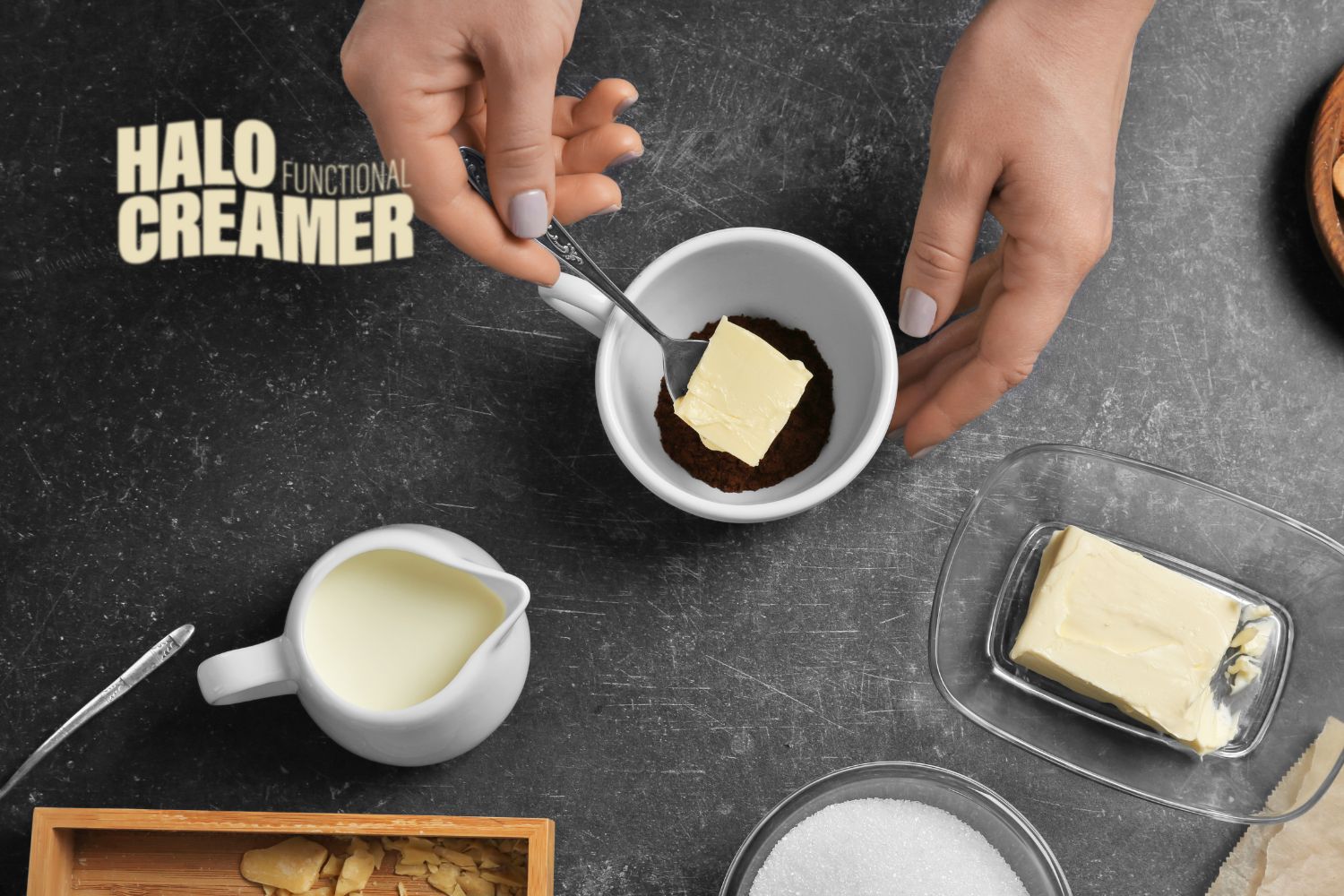
Common mistakes to avoid when making coffee with butter
Here are some mistakes to avoid when making coffee with butter.
•
Using salted butter: Salted butter can alter the taste of your coffee and may make your beverage too salty. You can also consider using MCT oil, a healthy alternative
•
Not blending long enough: Blending your coffee and butter thoroughly for at least 20-30 seconds is important. This creates a nice creamy texture that mixes the coffee and butter well.
•
Not adding enough butter: Butter gives coffee with butter its unique taste and texture, so it's important to add enough butter. A good ratio is 1-2 tablespoons of butter per 1 cup of coffee. If you’re using BUBS Halo Creamer (MCT Oil), mix one scoop into your coffee with a blender, spoon, or mix wand.
•
Not using fresh coffee grounds: Using fresh coffee grounds is crucial for the best flavor. Stale grounds can result in a dull and undesirable taste. Try organic, fair trade medium to dark roast coffee.
•
Not adjusting other flavors: Coffee with butter can benefit from adding flavors like coconut oil or spices. Experiment with different combinations to find the taste you enjoy.
Potential drawbacks & precautions around coffee with butter
It is important to note that while some individuals may find butter coffee beneficial, it may not be suitable for everyone. Butter is a calorie-heavy food and high in saturated fat, so always consume it in moderation as part of a balanced diet. Individuals with health conditions, such as cardiovascular disease, may need to limit their saturated fat intake. Individuals with preexisting health conditions, food allergies, or dietary restrictions should also be cautious and consult their health practitioner. MCT oil could be an excellent alternative to butter, offering a clean and fast-acting high-energy source for your body. The MCT oil powder in BUBS Halo Creamer, for instance, is a purified, saturated fatty acid, extracted from sustainably sourced coconuts and is gentle on the digestive system. Consulting a healthcare professional or registered dietitian before making any major changes to your diet, is always recommended. Best healthy option for coffee with butter enthusiasts
Most of us need to start our mornings with a cup of coffee — so you may as well get all the health benefits you can from your daily cuppa. If you’re curious about butter coffee and its health benefits and want to try it yourself, make sure you’re using high-quality ingredients.
Start with your pick of medium or dark roast coffee - preferably choose high-quality, organic, and fair trade certified coffee beans. The original recipe calls for grass-fed butter, but if you don’t have that, use the best unsalted butter you can find, and add the right amount (not more than one tbsp) to your brew. BUBS Halo Creamer is the most convenient form of MCT oil in a powder format that you can add to your daily butter coffee.
It’s packed with medium-chain triglycerides and health-boosting fats. Additionally, it’s gluten-free, keto-friendly, and Whole30 Approved®. With zero sugar and no harmful preservatives, you never need to worry about extra calories. It can also be combined with collagen peptides for a powerful addition to your morning routine. Butter coffee may not be for everyone, but its growing popularity is hard to ignore. If you enjoy the taste and it suits you, the health benefits make it worthy of consideration.